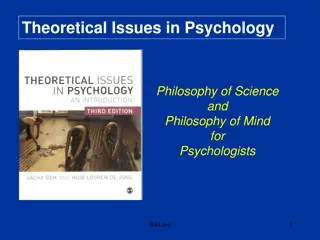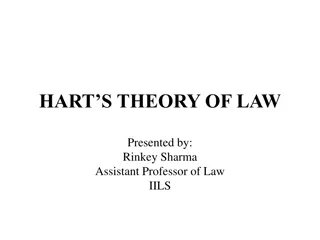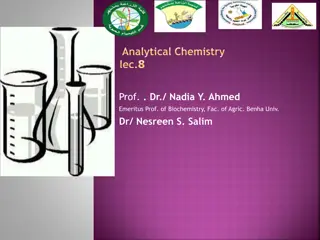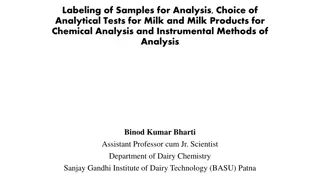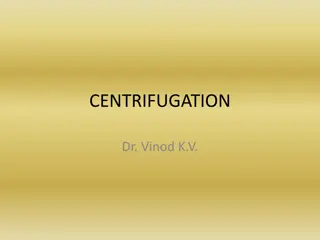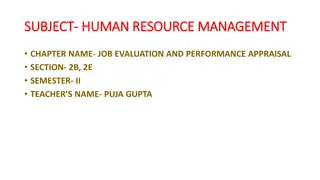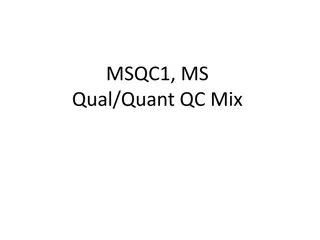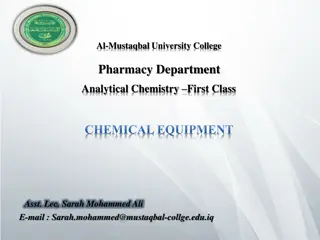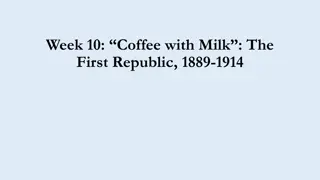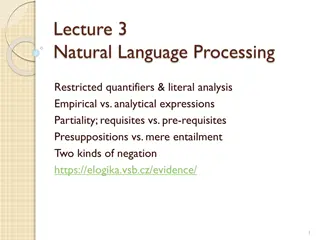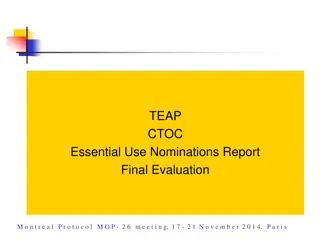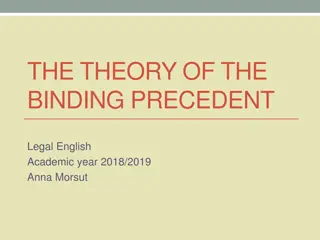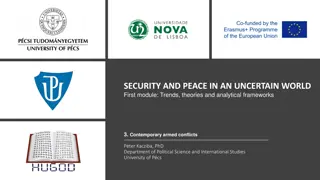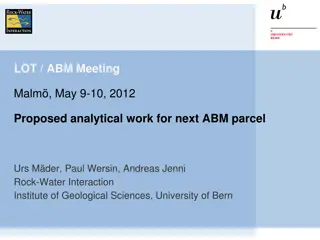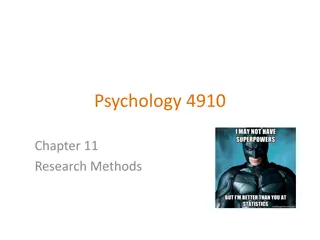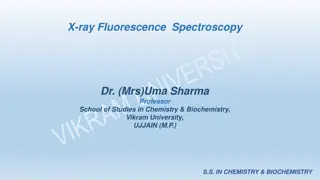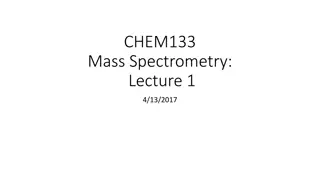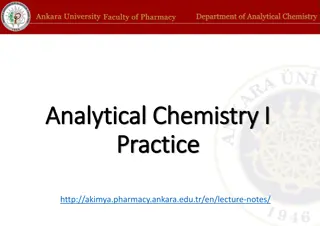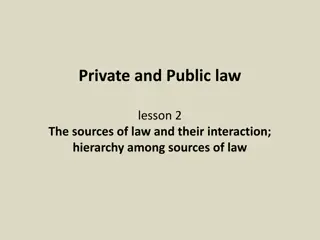Revolutionizing Data Management with HTAP Databases
Organizations handle a vast amount of data daily, necessitating efficient systems like Hybrid Transactional Analytical Processing (HTAP). This advanced system streamlines online transaction processing (OLTP) and analytical processing (OLAP), enabling real-time insights and prompt actions. HTAP datab
2 views • 22 slides
Population and Housing Censuses Directorate - Midterm Review Mission Summary
The Population and Housing Censuses Directorate (PHCD) is actively involved in implementing various censuses, updating geographical databases, and conducting analytical studies. They are preparing for the next census in 2027 by learning from international experiences and modern methodologies. The di
0 views • 12 slides
National Conference of Enforcement Chiefs: Enhancing Tax Compliance and Enforcement Practices
The National Conference of Enforcement Chiefs held by the Commercial Taxes Department, Government of Andhra Pradesh, focused on nurturing tax compliance, targeting evasion cases, preventing harassment, and overseeing tax administration to curb high-pitch demands. The enforcement wing emphasized data
0 views • 16 slides
Cleveland Airport System Environmental Analytical Services Pre-Qualification Meeting Overview
The City of Cleveland, Department of Port Control is hosting a pre-qualification meeting for environmental analytical and regulatory services for the Cleveland Airport System. The meeting agenda includes project scope, safety and security requirements, operations, DBE requirements, and a Q&A session
0 views • 35 slides
Analytical Balances Market Overview, Trends, Landscape Overview Forecast 2022-20
Adroit Market Research has included the Global Analytical Balances Market\u00a0research to its database in order to provide a thorough analysis of the variables driving a general market growth trend. The study contains a lot of information and is a useful tool for professionals in the field.
0 views • 5 slides
Theoretical Issues in Psychology: Philosophy of Science and Mind
Exploring the philosophy of science in psychology, this content delves into key concepts such as positivism, logical positivism, the Vienna Circle, and the scientific process according to positivists. It discusses influential thinkers like Wittgenstein, Popper, Kuhn, and Feyerabend, shedding light o
3 views • 35 slides
Life and Contributions of Auguste Comte: A Pioneer of Sociology and Positivism
Auguste Comte, born in 1798, is renowned as the father of sociology who coined the term. He made significant contributions to social theory, particularly with his "Laws of Three Stages" and the positivist philosophy. Despite personal struggles, he published influential works and left a lasting impac
0 views • 13 slides
Theories of International Relations Overview
The field of International Relations (IR) encompasses various theories that seek to explain global phenomena, drawing from disciplines like history, philosophy, and economics. Theory, derived from contemplation and speculation, organizes ideas to explain issues such as state emergence, conflict caus
1 views • 47 slides
H.L.A. Hart's Theory of Law: An Overview
H.L.A. Hart's theory of law, as outlined in his book "The Concept of Law," presents a unique perspective on the relationship between law and morality. Hart's concept differs from earlier legal positivist theories and he categorized later positivism into Inclusive, Exclusive, and Interpretative group
0 views • 11 slides
Overview of Analytical Positivism in Legal Theory
The Analytical Positivism school, also known as the Austinian school, emphasizes a sharp separation between law and morality. It views law as a command and emphasizes the importance of law as it is, rather than how it ought to be. This approach, championed by thinkers like John Austin and Jeremy Ben
0 views • 19 slides
Back Titration in Analytical Chemistry
Back titration is a technique used in analytical chemistry to determine the concentration of an analyte by reacting it with an excess of another reagent first, followed by titration of the excess reactant. This method is especially useful in cases where direct titration endpoints are difficult to di
2 views • 14 slides
Guidelines for Sample Labeling and Analytical Tests in Milk Products Analysis
Understanding the importance of food labeling in milk products analysis, this article covers the process of labeling samples for various analytical tests. It emphasizes the need for precise information on sample containers, including supplier details, sampling date/time, product nature, identificati
0 views • 13 slides
The Applications and Design of Analytical Ultracentrifugation
Analytical ultracentrifugation, a powerful technique in biochemistry, allows for precise measurement of sample properties and characterization of macromolecular complexes. The method is widely used for determining sample purity, equilibrium constants, and assembly mechanisms of biological complexes.
1 views • 17 slides
Ethical Studies Course Overview and Activities
Delve into the world of Ethical Studies with this comprehensive course overview. Explore themes like Ethical Language and Thought, Natural Law, Situation Ethics, and more. Engage in activities like Virtue Ethics starters, fortune line graphs, and discussions on moral dilemmas. Dive into the principl
0 views • 17 slides
Importance and Methods of Job Evaluation in Human Resource Management
Job evaluation is essential in determining the value of a job within an organization, aiding in fair pay structures, employee selection, bonus calculations, and conflict resolution. However, it has disadvantages like inaccuracies, time consumption, and complexity. Steps involved include job analysis
3 views • 11 slides
Comprehensive Analysis of MS Qual/Quant QC Mix for Platform Characteristics Assessment
The MS Qual/Quant QC Mix (Sigma Aldrich) is designed for daily use in evaluating platform characteristics such as repeatability, system stability, and inter-/intra-platform comparisons. The content includes XIC analysis for peptides, a detailed table showing the difference in peak ratios, and correl
0 views • 11 slides
Common Laboratory Equipment and Their Uses in Analytical Chemistry
The pharmacy department's first-class in analytical chemistry at Al-Mustaqbal University College utilizes various common laboratory equipment for safe practices. This includes the balance for measuring mass, ring stand for holding glassware, graduated cylinder for precise liquid volume measurement,
0 views • 20 slides
Introduction to Analytical Chemistry and pH Detection
Analytical chemistry involves the study of detecting acids and bases in solutions, with methods such as litmus testing and the Arrhenius definition. The concept of conjugate acids and bases, acid dissociation, and buffer solutions are also key components in understanding chemical properties and reac
1 views • 36 slides
Embracing Positive Behavior Support in Our Team's Journey
Journey together towards achieving more by embracing positive behavior support in a team setting. Celebrate individual traits and roles that contribute to a cohesive and successful team dynamic, fostering nurturing, dependable, and analytical traits among members. Meet the diverse personalities cont
0 views • 19 slides
Coffee with Milk: The First Republic, 1889-1914
Marshall Deodoro da Fonseca led the First Republic of Brazil, embracing Positivism as a guiding philosophy. The era witnessed the clash between Orthodox and Heterodox Positivists, urban reforms in cities like Rio de Janeiro, and the intertwining of positivism with republicanism. The period also saw
0 views • 22 slides
Empirical vs Analytical Expressions in Natural Language Processing
Restricted quantifiers and literal analysis in natural language processing reveal the distinctions between empirical and analytical expressions. While empirical expressions refer to non-trivial intensions that require empirical investigation, analytical expressions denote constant intensions that ca
1 views • 19 slides
Legal Philosophy: Rejection of Traditional Frameworks
Explore various schools of legal philosophy such as natural law, legal positivism, legal realism, legal process, and critical legal studies. Discover the evolution of civil rights through key amendments and landmark cases shaping modern legal interpretations.
1 views • 194 slides
Reassessment of Essential Use Nominations for Laboratory and Analytical Applications of CTC
The Clean Development Mechanism Executive Board's Technical and Economic Assessment Panel (TEAP) and the Chemical Technical Options Committee (CTOC) conducted a reassessment of the Essential Use Nomination (EUN) of 80 tonnes of Carbon Tetrachloride (CTC) for laboratory and analytical purposes in Chi
0 views • 4 slides
Wander Join: Online Aggregation via Random Walks in Database Workloads
Wander Join is a technique for online aggregation using random walks, addressing challenges in efficiency and correctness in both transactional and analytical database workloads. It allows for complex analytical queries such as TPC-H queries and provides insights into revenue loss due to returned or
0 views • 27 slides
The Theory of Binding Precedent in Legal English
Explore the concept of binding precedent in legal English, focusing on how similar cases are treated alike in civil law and common law systems. Learn about the history behind the establishment of binding precedents and the role of key entities like the Incorporated Council of Law Reporting. Delve in
0 views • 12 slides
Laboratory Process Control and Error Prevention
Explore the comprehensive process control measures in laboratory workflows to minimize errors at each stage, from pre-analytical to analytical phases. Learn about best practices for sample collection, handling, equipment management, and quality assurance to ensure accurate and reliable test results.
0 views • 11 slides
The Symbolist Movement in Literature
The Symbolist Movement in literature emerged in France in the 1850s, lasting till 1900, influencing 20th-century arts and bridging Realism to Modernism. Symbolists aimed to convey personal, dream-like states with metaphorical language, challenging positivism and realism. Stylistically, they emphasiz
0 views • 16 slides
Trends, Theories, and Analytical Frameworks in Contemporary Armed Conflicts
This module explores current trends, theories, and analytical frameworks in contemporary armed conflicts, presented by Dr. Pter Kacziba from the Department of Political Science and International Studies at the University of Pcs. The content delves into the complexity of security and peace in an unce
0 views • 15 slides
Analytical Work for Rock-Water Interaction at LOT/ABM Meeting
Proposed analytical work for the next ABM parcel focuses on trace minerals, soluble salts, and dissolved organic acids in the context of rock-water interactions. The investigation includes qualitative measurements, new separation techniques, and analysis of iron-bentonite interactions. The aim is to
0 views • 9 slides
Evolution of Research Methods in Psychology
The evolution of research methods in psychology is marked by significant developments such as introspection in the 19th century, logical positivism in the 1920s, and the emphasis on falsifiability and operational definitions. This evolution influenced how psychologists approached gathering knowledge
0 views • 25 slides
Official Statistics in Social Research
Explore the significance of official statistics in social research, including different types like hard and soft statistics, advantages and disadvantages, and the role they play in shaping sociological methods. Discover how statistics help quantify aspects of society, the relationship between positi
0 views • 9 slides
Applications and Importance of X-ray Fluorescence Spectroscopy in Analytical Chemistry
X-ray Fluorescence Spectroscopy (XRF) is a vital analytical technique used for qualitative and quantitative analysis of elements based on their X-ray emission characteristics. Dr. Uma Sharma, a Professor at Vikram University, details various X-ray analytical methods, including X-ray emission, Auger
0 views • 21 slides
Mastering GCSE Analytical Writing and Language Techniques
Enhance your GCSE analytical writing skills with tips on PEEE structure, language features, and structure mnemonic like NESTS for narrative voice. Dive into paragraphs, sentence structures, and descriptive/figurative language techniques. Explore the persuasive and rhetorical language elements like A
0 views • 12 slides
Introduction to Mass Spectrometry: Analytical Chemistry Branch
Mass spectrometry is a vital branch of analytical chemistry, used for qualitative and quantitative analysis of molecular weight, elements, and formulas. It plays a crucial role in identifying compounds and their structures through ionization, separation, and detection of ions by utilizing various te
0 views • 24 slides
Analytical Solutions for 2D Heat Equation with Separation of Variables
Consider the steady-state 2D heat equation with constant thermal conductivity. Analyze analytical solutions using separation of variables method for a square plate with defined boundary conditions. Learn how to express the general form of solutions and apply them to the heat equation in Cartesian ge
0 views • 15 slides
Analytical Chemistry: Course Overview and Objectives
This article provides insights into the field of Analytical Chemistry, outlining a course syllabus, objectives, topics covered, and grading criteria. Analytical Chemistry involves obtaining and processing information about the composition and structure of matter. Analytical chemists play a crucial r
0 views • 15 slides
Early Positivism and the Positive School of Criminology
The early positivist school of criminology, including figures like Lombroso and Gall, focused on applying scientific methods to understand criminal behavior. Phrenology, atavism, and criminal anthropology were key concepts explored, emphasizing determinism and individual offender characteristics. Th
0 views • 18 slides
Overview of Legal Philosophy and Civil Rights Amendments
Understanding various legal philosophies such as natural law, legal positivism, legal realism, legal process, and critical legal studies, this content delves into the historical context of civil rights amendments, including the 13th, 14th, and 15th Amendments. It discusses significant cases and prov
0 views • 194 slides
Mastering Analytical Paragraph Structure for Critical Thinking in Writing
Understanding the foundation of critical thinking in writing through analytical paragraph structure is key to effective communication. Analysis involves exploring the who, what, when, where, and why of a topic, making claims, and drawing connections. Differentiating analytical paragraphs from standa
0 views • 6 slides
The Hierarchy and Interaction of Legal Sources
Delve into the complex world of legal sources and their hierarchy in private and public law. Explore the essence of norms, their subjects, and essential characteristics like positivism, enforceability, social relevance, and generality. Gain insights into how laws are formulated to govern society eff
0 views • 23 slides





